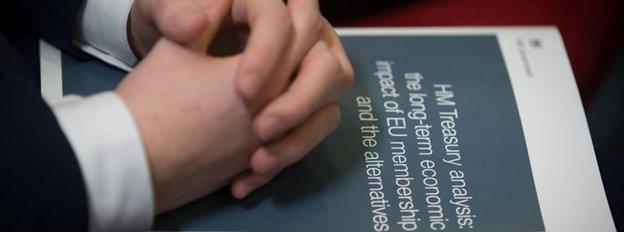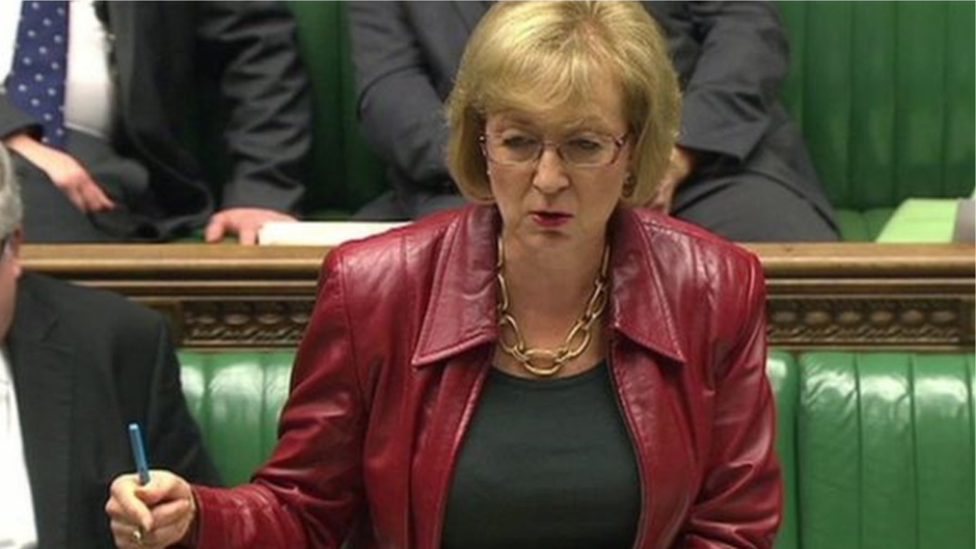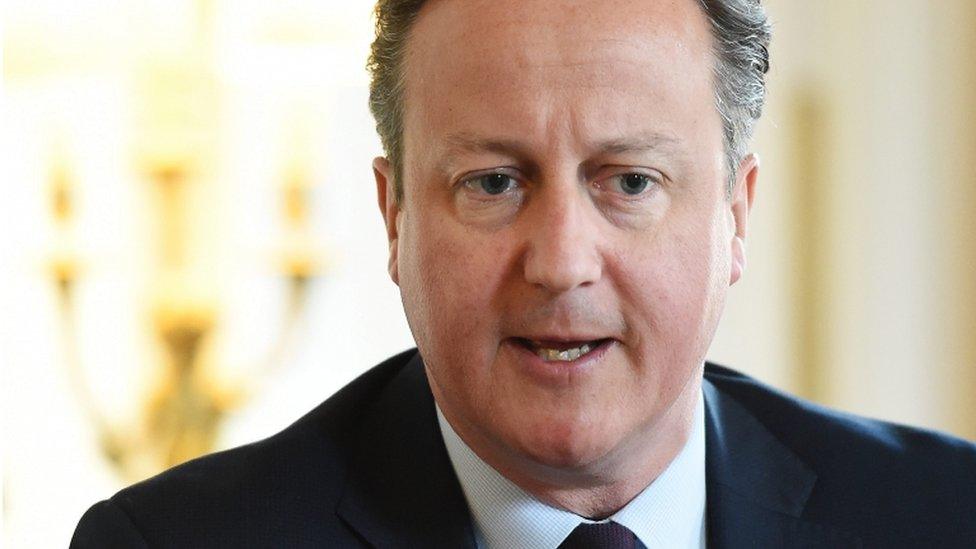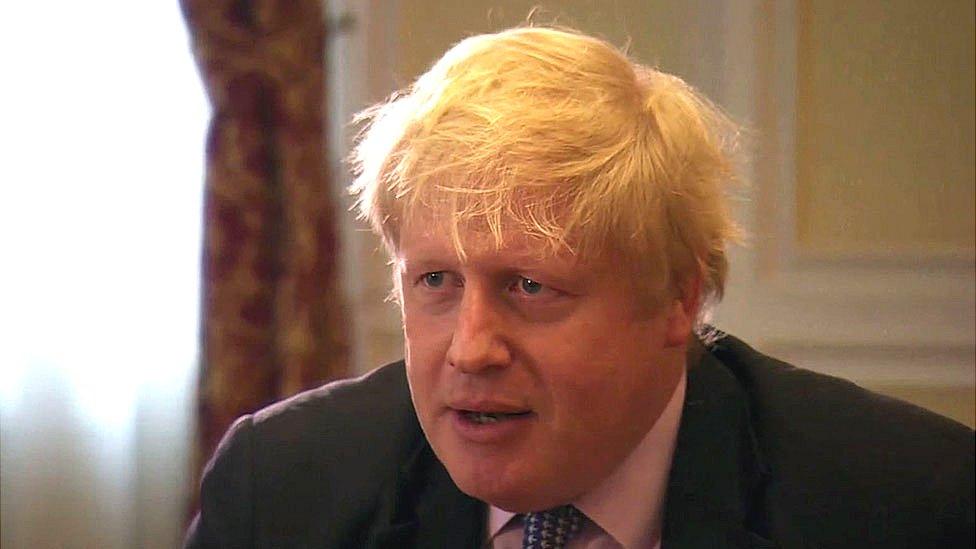George Osborne defends Treasury's gloomy EU exit forecast
- Published
- comments
George Osborne: 'Britain permanently poorer outside the EU'
Chancellor George Osborne has defended claims an EU exit would cost households an average £4,300 a year - after Leave campaigners said it was "absurd".
A Treasury analysis says the UK economy would be 6% smaller if it left the EU than it would otherwise be by 2030.
This would leave a £36bn hole in the public finances said Mr Osborne, who called the report "serious and sober".
But exit campaigners said the estimates were "worthless" and "unbelievable" given the Treasury's past record.
Former Conservative Chancellor Lord Lamont, of Vote Leave, said: "The chancellor has endorsed a forecast which looks 14 years ahead and predicts a fall in GDP of less than 0.5% a year - well within the margin of error.
"Few forecasts are right for 14 months, let alone 14 years. Such precision is spurious, and entirely unbelievable."
Meanwhile, Conservative MP John Redwood, also campaigning for an Out vote, pointed out the Treasury had "failed to forecast the huge damage membership of the European Exchange Rate Mechanism inflicted on us", as well as the impact of the 2011 Eurozone crisis.
"I think their 2030 forecast is completely worthless," he said.
But Mr Osborne told BBC Radio 4's Today: "The conclusions could not be clearer. Britain would be permanently poorer if we left the EU to the tune of £4,300 for every household in the country. That's a fact everyone should think about "

Analysis, BBC political editor Laura Kuenssberg

For the chancellor, the prime minister and the Remain campaign, this is the week they hope undecided voters begin listening.
For starters, 200 pages of hypothetical number crunching has emerged that boils down to one core message: if you vote to leave the EU your wallet will suffer, George Osborne asserts.
The country wouldn't just be harmed in the possible immediate chaos of a vote to leave, but the Treasury claims the economy would significantly, and irrevocably, shrink.
The Leave campaign rejects the official analysis - saying the Treasury has been wrong before. They say leaving the EU will ultimately make the country richer.
But it is becoming harder by the day for those arguing for exit not to offer clear-costed alternatives. And there won't be much let up for them. Read more from Laura

The chancellor said "it would be the poorest" who would be most affected by an EU exit, citing people whose jobs "depend" on the car plants and steel making factories.
"They are the people whose incomes would go down, whose house prices would fall, whose job prospects would weaken, they are the people who always suffer when the country takes an economic wrong turn," he said.
Mr Osborne later said in a speech setting out the report's details that EU membership had increased UK trade with EU countries by about "three quarters".
Boris Johnson: Treasury estimate is 'wrong'
The 200-page Treasury document, written by government economists, says there would be a £36bn a year hit for the UK's public finances if it left the EU - which is equivalent to £4,300 a year per household in the UK or equivalent to raising the basic rate of income tax by 8p.
BBC political editor Laura Kuenssberg said the figure allowed the Remain side to make the argument that there would have to be big spending cuts or tax rises to plug the gap.
The report looks at three scenarios in the event of a vote to leave the EU on 23 June.
First, the UK gains a "Norway-style" deal and joins the European Economic Area (EEA)
Second, the UK executes a bilateral deal with the EU similar to the one being agreed with Canada - a trade deal that has taken seven years to negotiate
Third, the UK has a trade relationship with the EU under World Trade Organization (WTO) rules, similar to the relationship between the EU and countries like Russia and Brazil
Each scenario has a strong negative impact on the economy, according to the report, but the forecasted 6% hit to national income growth is based on the Canadian trade model with the EU.
'How negative?'
Leave campaigners, including London mayor Boris Johnson, have said there would be no downsides to leaving, and suggested the UK could ape Canada's trade arrangement with the EU.
But Mr Osborne said it was "economically illiterate" to say the UK could retain "all the benefits" of EU membership and "none of the obligations or costs".
Any trade arrangement would lead to less access to the EU single market unless Britain was prepared to pay into the EU budget and accept the free movement of people, he said.

Minister Andrea Leadsom criticised the 'extraordinarily biased' report
Commenting on the Treasury report, Paul Johnson, director of economic think tank the Institute of Fiscal Studies, said voters can "put quite a lot of store" by the idea that a vote to leave would have a negative impact on the UK economy.
"Exactly how negative? Much more difficult to be clear about," he said.
Labour leader Jeremy Corbyn said he did not know how the Treasury reached the £4,300 figure but he said Labour supported staying in the EU "to defend social gains and workers' rights". "We don't just want a free market Europe. We actually want a Europe that does care for all its citizens," he added.
Vote Leave said the report failed to consider the impact of continued high migration to the UK, as the document was based on an assumption that net migration would fall to 185,000 a year from 2021 - exceeding the government's "tens of thousands" target.
Energy minister Andrea Leadsom, a Vote Leave supporter, said: "A much fairer way to present this argument would be to also look at the impact if we remain in on further migration, further pressure on public services, the impact on security and so on."
'Scaremongering'
UKIP finance spokesman Steven Woolfe accused the chancellor of politicising the Treasury and said the report's "base assumptions are questionable at best and useless at worst".
He said there were "more potential benefits, less uncertainties" in leaving than staying in, and added: "It's a pity that the Treasury was not tasked to investigate this scenario rather than disappearing down a forecasting rabbit hole dug by George Osborne."
Meanwhile, Leave.EU chairman and UKIP donor Arron Banks, while contesting the government's estimates, said that even if they turned out to be correct, it was "a bargain basement price" for an EU exit.
But Andrew Mackenzie, head of mining giant BHP Billiton, said there would be a decade of uncertainty if the UK voted to leave the EU, and that the country would be reduced to "rule takers".
In a related development, the National Farmers Union said it believed staying in the EU was in the "best interests" of its members on the basis of the "existing evidence" - citing the benefits of the EU's Common Agricultural Policy and the potential uncertainty caused by leaving.
But it said it recognised the range of views in the farming community and said it would not be actively campaigning in the referendum.
- Published17 April 2016

- Published16 April 2016

- Published17 April 2016